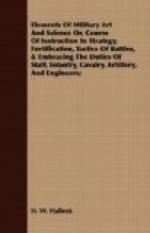History furnishes abundant proofs of the impolicy of relying upon undisciplined forces in the open field. Almost every page of Napier’s classic History of the Peninsular War contains striking examples of the useless waste of human life and property by the Spanish militia; while, with one quarter as many regulars, at a small fractional part of the actual expense, the French might have been expelled at the outset, or have been driven, at any time afterwards, from the Peninsula.
At the beginning of the French Revolution the regular army was abolished, and the citizen-soldiery, who were established on the 14th of July, 1789, relied on exclusively for the national defence. “But these three millions of national guards,” says Jomini, “though good supporters of the decrees of the assembly, were nevertheless useless for reinforcing the army beyond the frontiers, and utterly incapable of defending their own firesides.” Yet no one can question their individual bravery and patriotism; for, when reorganized, disciplined, and properly directed, they put to flight the best troops in Europe. At the first outbreak of this revolution, the privileged classes of other countries, upholding crumbling institutions and rotten dynasties, rushed forth against the maddened hordes of French democracy. The popular power, springing upward by its own elasticity when the weight of political oppression was removed, soon became too wild and reckless to establish itself on any sure basis, or even to provide for its own protection. If the attacks of the enervated enemies of France were weak, so also were her own efforts feeble to resist these attacks. The republican armies repelled the ill-planned and ill-conducted invasion by the Duke of Brunswick; but it was by the substitution of human life for preparation, system, and skill; enthusiasm supplied the place of discipline; robbery produced military stores; and the dead bodies of her citizens formed epaulements against the enemy. Yet this was but the strength of weakness; the aimless struggle of a broken and disjointed government; and the new revolutionary power was fast sinking away before the combined opposition of Europe, when the great genius of Napoleon, with a strong arm and iron rule, seizing upon the scattered fragments, and binding them together into one consolidated mass, made France victorious, and seated himself on the throne of empire.
No people in the world ever exhibited a more general and enthusiastic patriotism than the Americans during the war of our own Revolution. And yet our army received, even at that time, but little support from irregular and militia forces in the open field. Washington’s opinions on this subject furnish so striking a contrast to the congressional speeches of modern political demagogues, who, with boastful swaggers, would fain persuade us that we require no organization or discipline to meet the veteran troops of Europe in the open field, and who would hurry us,




